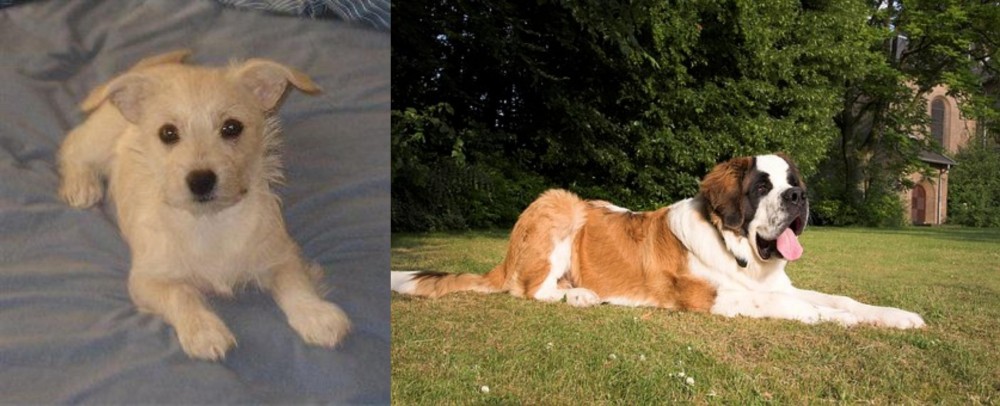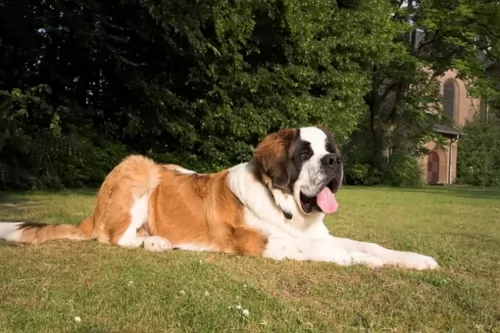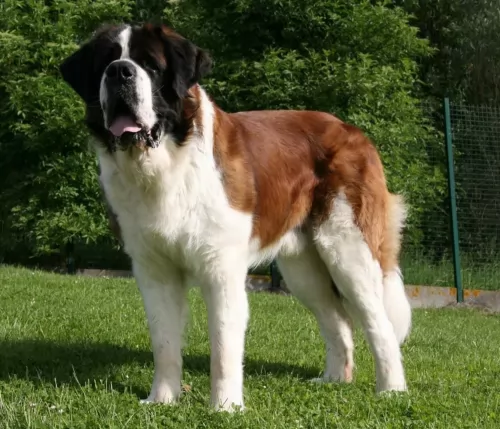 Petzlover
Petzlover Chipoo is originated from United States but St. Bernard is originated from Switzerland. Chipoo may grow 33 cm / 12 inches shorter than St. Bernard. Chipoo may weigh 81 kg / 178 pounds lesser than St. Bernard. Chipoo may live 5 years more than St. Bernard. Chipoo may have less litter size than St. Bernard. Chipoo requires Low Maintenance. But St. Bernard requires High Maintenance
Chipoo is originated from United States but St. Bernard is originated from Switzerland. Chipoo may grow 33 cm / 12 inches shorter than St. Bernard. Chipoo may weigh 81 kg / 178 pounds lesser than St. Bernard. Chipoo may live 5 years more than St. Bernard. Chipoo may have less litter size than St. Bernard. Chipoo requires Low Maintenance. But St. Bernard requires High Maintenance
 The Chipoo is not a purebred dog but rather a cross between the Toy Poodle and the Chihuahua. In the 1970’s the two breeds were crossed and the Chipoo was born. Chihuahuas have their origin in Mexico while the poodle is believed to come from Germany. This hybrid dog, because he comes form two purebred dogs is considered to be a designer dog. The Chipoo is not of course a purebred dog and is not recognized by the American kennel Club (AKC), but it is recognized by the designer groups and hybrid groups. These organizations include the International Designer Canine Registry, the American Canine Hybrid Club, the Designer Breed Registry, and the Designer Dogs Kennel Club.
The Chipoo is not a purebred dog but rather a cross between the Toy Poodle and the Chihuahua. In the 1970’s the two breeds were crossed and the Chipoo was born. Chihuahuas have their origin in Mexico while the poodle is believed to come from Germany. This hybrid dog, because he comes form two purebred dogs is considered to be a designer dog. The Chipoo is not of course a purebred dog and is not recognized by the American kennel Club (AKC), but it is recognized by the designer groups and hybrid groups. These organizations include the International Designer Canine Registry, the American Canine Hybrid Club, the Designer Breed Registry, and the Designer Dogs Kennel Club.
 The St Bernard breed was once called the Alpine Cattle Dogs or the Alpine Mountain Dogs. They have always been farm dogs and mountain dogs in the French and Swiss Alps. They come from the border land of Switzerland and France. They were herding dogs, hunting, search and rescue, watchdogs and draft dogs.
The St Bernard breed was once called the Alpine Cattle Dogs or the Alpine Mountain Dogs. They have always been farm dogs and mountain dogs in the French and Swiss Alps. They come from the border land of Switzerland and France. They were herding dogs, hunting, search and rescue, watchdogs and draft dogs.
Their ancestors are considered to include the Sennenhunds and molosser breeds that came to the Alps with the ancient Romans. There are four Sennenhund breeds that are believed to have contributed to the original St. Bernard. These included the Greater Swiss Mountain Dog (Grosser Schweizer Sennenhund), the Appenzeller (Appenzeller Sennenhund), the Bernese Mountain Dog (Berner Sennenhund) and the Entlebucher Mountain Dog (Entlebucher Sennenhund) Today the St. Bernard is considered a Molossoid breed.
The first we know of the St. Bernard in any written records was in 1707 at the Great St. Bernard Pass and Great St. Bernard Hospice run by monks. There were found paintings of the dogs dating back into the late 1600’s. It is told that Barry saved upward of 100 people in the St. Bernard pass, and it is from these stories that the dogs gained their snow rescue reputation.
The St. Bernard of that time did not look like the St. Bernard does today as there was much crossbreeding. Many dogs dies during rescues in the avalanches of the mid 1800’s and so they Saint was crossed with the Newfoundland to preserve the breed. You can today see the resemblance in the build and looks of the two breeds. This cross brought about the long haired St. Bernard whose fur was too heavy for rescues.
The St. Bernards of mountain rescue fame were only about the size of a German Shepherd dog and were short haired. After crossing with the Newfoundland and moving into clubs and dogs shows, they have been bred to be much larger. Before the stud book was closed, it is thought that many larger breeds such as the Greater Swiss Mountain Dog, the English Mastiff, the Tibetan Mastiff, the Rottweiler, the Great Pyrenees, the English Bulldog, the Great Dane, the Bernese Mountain Dog, the Boxer and the Caucasian Oycharka all contributed to today’s St. Bernard.
In 1884 The Swiss St. Bernard Club was founded and the breed entered the Swiss Stud book as its first entry in 1884. It was 1888 when the standard was approved and the breed became the national dog of Switzerland. Before the name St. Bernard came to be common, these dogs might be called, Barry Dogs, Alepnmastiff, Noble Steeds or Saint Dogs.
The dogs came to England in the early 1800s and to the United States soon after. They were recognized by the European kennel clubs first and by the early 1900’s they were the most popular breed in the AKC.
 The Chipoo varies greatly in looks depending upon which breed it got most of its characteristics from. It is a toy dog, but it can have a curly coat or a straight one. It can be fluffy or wiry. It can be just about any color. All of them have Chihuahua tails but again depending on the mix, they can look like poodles or they can look like chihuahuas. They can vary in size from a very small toy to a larger sized small dog. You can have two Chipoos from the same litter and they will not be recognizable as littermates. However, they will all be adorable.
The Chipoo varies greatly in looks depending upon which breed it got most of its characteristics from. It is a toy dog, but it can have a curly coat or a straight one. It can be fluffy or wiry. It can be just about any color. All of them have Chihuahua tails but again depending on the mix, they can look like poodles or they can look like chihuahuas. They can vary in size from a very small toy to a larger sized small dog. You can have two Chipoos from the same litter and they will not be recognizable as littermates. However, they will all be adorable.
 Today’s St. Bernard is not a large dog, he is a giant dog. Weighing in at 140-200 pounds and standing 28 to 35 inches tall, he is a lot of dog. Bred with mastiffs and large mountain dogs, they have proportional and powerful build. They are strong, sturdy and well muscled. They have either a smooth or rough (short or long) coat. Their eyes are brown or occasionally blue. They have tight lids, and square heads and muzzles.
Today’s St. Bernard is not a large dog, he is a giant dog. Weighing in at 140-200 pounds and standing 28 to 35 inches tall, he is a lot of dog. Bred with mastiffs and large mountain dogs, they have proportional and powerful build. They are strong, sturdy and well muscled. They have either a smooth or rough (short or long) coat. Their eyes are brown or occasionally blue. They have tight lids, and square heads and muzzles.
There are two coat types called smooth and rough, or short and long. The smooth shorter coat is tough, flat and close against the body and the long, rough coat is dense, wavy and heavy around the legs, neck and ruff. Both types have long tails that hang low and are heavy. Saints are known to slobber, drool and snore.
 3.Adaptability no - these are giant dogs that need a lot of room. A large fenced yard or farm is best. They won’t do well in an apartment. They need exercise every day and loping around a yard is very good for them. They love to play in the snow, carry a backpack or pull a cart. They love to have a “job”
3.Adaptability no - these are giant dogs that need a lot of room. A large fenced yard or farm is best. They won’t do well in an apartment. They need exercise every day and loping around a yard is very good for them. They love to play in the snow, carry a backpack or pull a cart. They love to have a “job”
4.Learning ability – They are smart and highly trainable if motivated. They may appear lazy but they are just laid back and need a motivation.
 Hybrid dogs often do better health wise than the original parents, but this is not true of 2nd and third generation crosses. However, this is not generally true of the Chipoo, as they are no longer bred poodle to chihuahua but rather Chipoo to Chipoo. They are basically healthy but face some issues such as:
Hybrid dogs often do better health wise than the original parents, but this is not true of 2nd and third generation crosses. However, this is not generally true of the Chipoo, as they are no longer bred poodle to chihuahua but rather Chipoo to Chipoo. They are basically healthy but face some issues such as:
This is what causes the tear stains on most small light-colored dogs. This is called Epiphora and is not an irritation in the eye, just overly active glands.
This is low blood sugar and can cause all kinds of problems for your Chipoo. This can be fatal if not cared for. It has many causes if the dog is not diabetic including Xylitol (sugar free gum and other) parasites, stress, diarrhea or bacteria.
This loose knee cap condition is found in many small breeds and can lead to arthritis and lameness.
 The first problem this breed faces is how fast they grow and gain weight. This can lead to serious health issues if not controlled. Their bones can be damaged by this excessively fast rate of growth. Other issues facing the breed include:
The first problem this breed faces is how fast they grow and gain weight. This can lead to serious health issues if not controlled. Their bones can be damaged by this excessively fast rate of growth. Other issues facing the breed include:
 Because they are prone to hypoglycemia, make sure you feed a high quality dry food and break it up into three or four small meals a day in order to maintain the blood sugar and avoid the drops and spikes that can cause them serious health issues.
Because they are prone to hypoglycemia, make sure you feed a high quality dry food and break it up into three or four small meals a day in order to maintain the blood sugar and avoid the drops and spikes that can cause them serious health issues.
This is common in the Chipoo and it makes it hard for the dog to absorb things through the skin such as topical ointments for ticks and flea prevention.
If the outside temperature is less than 50’, then your Chipoo needs to wear a sweater as they get cold very easily.
The Chipoo is an energetic little dog and he loves to go on walks, play in the yard and be with the family. Both the Chihuahua and the Poodle are very intelligent dogs and so this cross gets bored and destructive if not stimulated enough. He’ll be great at agility and obedience. Like the poodle you can teach him a lot of tricks.
 1.Feeding the puppy – You want to control their growth. Do not overfeed, and make sure they exercise but not too much. Feed a high quality large breed puppy food 3-4 X a day in small amounts.
1.Feeding the puppy – You want to control their growth. Do not overfeed, and make sure they exercise but not too much. Feed a high quality large breed puppy food 3-4 X a day in small amounts.
2.Feeding the adult – The problem you face with he adult St. Bernard is the potential for Bloat. Don’t over feed. Don’t feed before or after strenuous exercise. Feed 2-3 X a day in smaller amounts to prevent Bloat. Feed a high quality breed specific food if possible or an extra large breed formula.
4. Games and Exercises They need exercise but not as much as you might think. The St. Bernard is a laid back lumbering character so don’t over exercise her. They enjoy weight and cart pulling but they are not athletes who enjoy frisbee or agility. Search and rescue trials and tracking trials are perfect athletic endeavors for them.